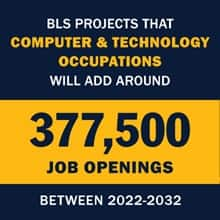What Does STEM Mean in Education?

Understanding the Numbers
When reviewing job growth and salary information, it’s important to remember that actual numbers can vary due to many different factors — like years of experience in the role, industry of employment, geographic location, worker skill and economic conditions. Cited projections do not guarantee actual salary or job growth.
When you pursue a college degree, you want to know that the time, money and effort you're investing will prepare you well for a career after graduation. A degree isn't just a piece of paper that you frame and hang on a wall. It should be a symbol of the fact that you're equipped with the skills and knowledge you need to succeed in the area of your choosing.
If you're looking for an area of study that will prepare you for a successful career, consider entering into the STEM field. With a STEM education, you’ll be well-positioned to enter into a satisfying and lucrative field after graduation, and provides you with skills that can translate favorably to any workplace environment.
What Does STEM Mean?
Let’s start with a basic question: Exactly what does STEM mean? It's a term many are familiar with, but don’t necessarily understand. STEM is a common abbreviation for four closely connected areas of study: science, technology, engineering and mathematics. The fields are often associated due to the similarities that they share both in theory and practice.
There's been a significant push in recent years to fill STEM jobs in the United States. Despite a focus on filling STEM-related jobs, American businesses can't fill their STEM jobs at an appropriate pace. According to the National Association of Manufacturing and Deloitte, 2 million manufacturing jobs are expected to go unfilled until 2025 due to a skill gap (Deloitte Review pdf source). Despite talent crunches in some industries, the U.S. Bureau of Labor Statistics (BLS) projects that occupations in the STEM field are expected to grow by 10.8% through 2032, compared with 2.3% for non-STEM occupations.*
Hands-On Learning in STEM Education
In Southern New Hampshire University’s (SNHU) STEM programs, courses focus on real-world tools that equip graduates to succeed in careers after they complete their education. Highly skilled faculty members bring valuable field experiences to their courses to ensure that students have the skills necessary to excel in STEM positions. SNHU is even exploring ways to utilize virtual reality experiences in a classroom environment to help STEM students enhance their knowledge.
Find Your Program

When it comes to women in STEM at the university, Dr. Anat Eshed, assistant VP of strategy, architecture and performance at SNHU, said, “SNHU is a change agent in the higher education industry.”
The Skills You Need in Any Career
Whether or not you want to pursue a STEM job after graduation, a degree in this area can still be an asset in your future job search as a result of the skills that you develop. When you pursue a degree in this field, you're not limited to a career in science, technology, engineering or mathematics. While you'll be well prepared for one of these fields after graduation, the STEM skills that you'll develop through your studies will equip you for success in any field.

- Information security analysts protect an organization's computer systems. Most information security analyst positions require a bachelor's degree in a computer-related field, such as bachelor's degree in cybersecurity. According to BLS, information security analysts earned a median salary of $112,000 in 2022, with a 32% job growth through 2032.*
- Software developers create applications or systems that run on a computer or another device. According to BLS, software developers earned a median salary of $124,200 in 2022.* Earning a bachelor's degree in computer science is a good way to obtain the strong computer programming skills needed to excel in this career, which is predicted by BLS to grow by 25% from 2022 to 2032.*
- Computer and information research scientists design new approaches to computer technology. This field is projected to grow 23% from 2022 to 2032 according to BLS and computer and information research scientists earned a median salary of $136,620 in 2022.* Individuals in this career often hold a master's degree in information technology or a related field.
The STEM skills that you'll develop are a valuable asset. Your education will provide vital skills, like problem solving and critical thinking, that are beneficial both in and out of the workplace. Employers are looking for candidates who know how to think creatively and innovatively and will be able to solve problems the company faces, no matter what field you pursue.
A degree can change your life. Find the SNHU STEM program that can best help you meet your career goals.
*Cited job growth projections may not reflect local and/or short-term economic or job conditions and do not guarantee actual job growth. Actual salaries and/or earning potential may be the result of a combination of factors including, but not limited to: years of experience, industry of employment, geographic location, and worker skill.
Alexa Gustavsen '21 is a writer at Southern New Hampshire University. Connect with her on LinkedIn.
Explore more content like this article

How to Become a Software Engineer

What is Hour of Code? A Chance to Kickstart Your Coding Literacy

Is a Computer Science Degree Worth It?
About Southern New Hampshire University

SNHU is a nonprofit, accredited university with a mission to make high-quality education more accessible and affordable for everyone.
Founded in 1932, and online since 1995, we’ve helped countless students reach their goals with flexible, career-focused programs. Our 300-acre campus in Manchester, NH is home to over 3,000 students, and we serve over 135,000 students online. Visit our about SNHU page to learn more about our mission, accreditations, leadership team, national recognitions and awards.

